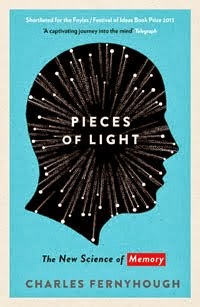No sooner had the warm liquid mixed with the crumbs touched my palate than a shiver ran through me and I stopped, intent upon the extraordinary thing that was happening to me. An exquisite pleasure had invaded my senses, something isolated, detached, with no suggestion of its origin. And at once the vicissitudes of life had become indifferent to me, its disasters innocuous, its brevity illusory—this new sensation having the effect, which love has, of filling me with a precious essence; or rather this essence was not in me, it was me.
Marcel Proust, In Search of Lost Time, vol. 1 (p. 60 of the edition pictured)
What follows is one of the most famous examples of remembering in literature. I am re-reading this extraordinary passage, however, conscious that the reality of the Proust phenomenon may not match up with its popular conceptions. Proust is everywhere in the neuroscience of learning and memory (I myself heard him quoted in undergraduate lectures on the topic). But do these invocations of the great man get Proust right?
Although Marcel's moment with the madeleine ultimately leads to the recapturing of memories of his childhood village of Combray, it is not an instantaneous process. As Douwe Draaisma has pointed out, Marcel actually faces a struggle to make sense of his feelings at the moment of tasting the madeleine. Further tastings don't work, at least not initially. "It is plain that the truth I am seeking lies not in the cup but in myself." (ibid., p. 61). The only way forward lies in deep, repeated plunges of introspection, after which, eventually, something starts to stir: "I can feel it mounting slowly; I can measure the resistance, I can hear the echo of great spaces traversed." (p. 62).
Even this isn't quite enough, and Marcel has to repeat the examination of his own experience "ten times over" (p. 63). It is as though the gustatory memory needs to make contact with the visual one, and they don't quite speak the same language. Douwe Draaisma concludes that the typical conception of Proustian memory as launching us immediately back into the past isn't quite true to what Proust wrote:
Although Marcel's moment with the madeleine ultimately leads to the recapturing of memories of his childhood village of Combray, it is not an instantaneous process. As Douwe Draaisma has pointed out, Marcel actually faces a struggle to make sense of his feelings at the moment of tasting the madeleine. Further tastings don't work, at least not initially. "It is plain that the truth I am seeking lies not in the cup but in myself." (ibid., p. 61). The only way forward lies in deep, repeated plunges of introspection, after which, eventually, something starts to stir: "I can feel it mounting slowly; I can measure the resistance, I can hear the echo of great spaces traversed." (p. 62).
Even this isn't quite enough, and Marcel has to repeat the examination of his own experience "ten times over" (p. 63). It is as though the gustatory memory needs to make contact with the visual one, and they don't quite speak the same language. Douwe Draaisma concludes that the typical conception of Proustian memory as launching us immediately back into the past isn't quite true to what Proust wrote:
In that sense, the scene with the madeleine is anything but a Proust phenomenon; it took the narrator a great deal of time to associate his spoonful of tea and the crumbs of the cake with remembered images. What emerged from one moment to the next was the association with a feeling, a feeling of delight; the remembered image was still a long way in coming.
Douwe Draaisma, Why Life Speeds Up As You Get Older (CUP), p. 33
I did a quick survey on Twitter and Facebook and found that many of my online friends had had Proustian memory experiences. Many of these redolent sensory moments, as you would expect, centred around the smell and taste of food. I am interested to know more about whether people's Proustian memories are instantaneous, as the received wisdom has it, or more drawn-out and effortful.
It's important to remember that Proust has plenty more to say about memory over the seven volumes of the novel, and that some of Marcel's later sensory encounters with the past have a much more immediate effect. There is some fascinating research on the historical influences on Proust's thinking about memory, and there is also a ton of great new science unpicking whether Proust was right about the power of smell and taste as triggers of memory (more on these topics another time). There is no doubt that the author remained convinced of their power, though, and it is only fitting that Marcel should get the last word:
But when from a long-distant past nothing subsists, after the people are dead, after the things are broken and scattered, taste and smell alone, more fragile but more enduring, more immaterial, more persistent, more faithful, remain poised a long time, like souls, remembering, waiting, hoping, amid the ruins of all the rest; and bear unflinchingly, in the tiny and almost impalpable drop of their essence, the vast structure of recollection.
Marcel Proust, In Search of Lost Time, vol. 1 (pp. 63-64 of the edition pictured)






